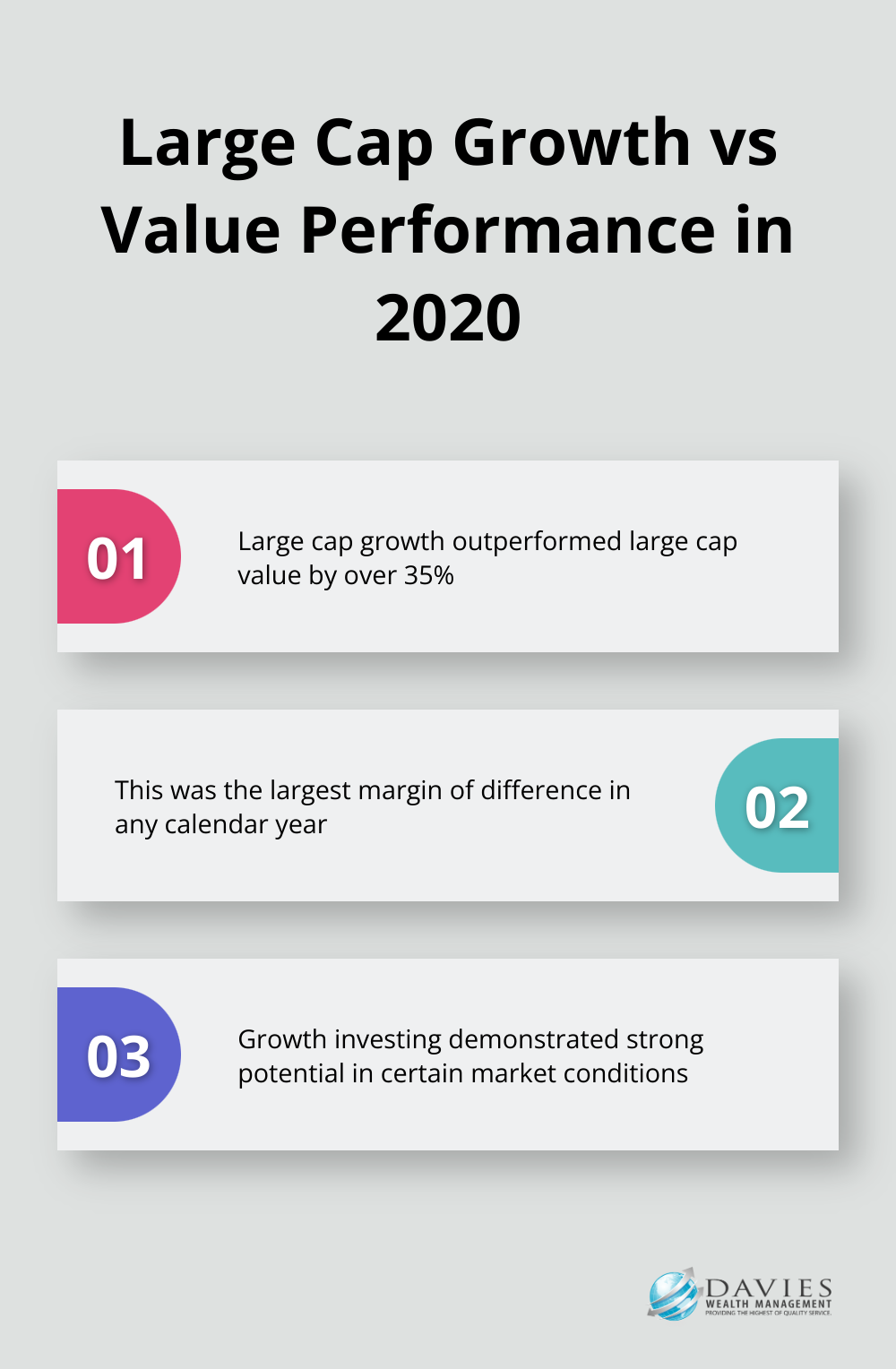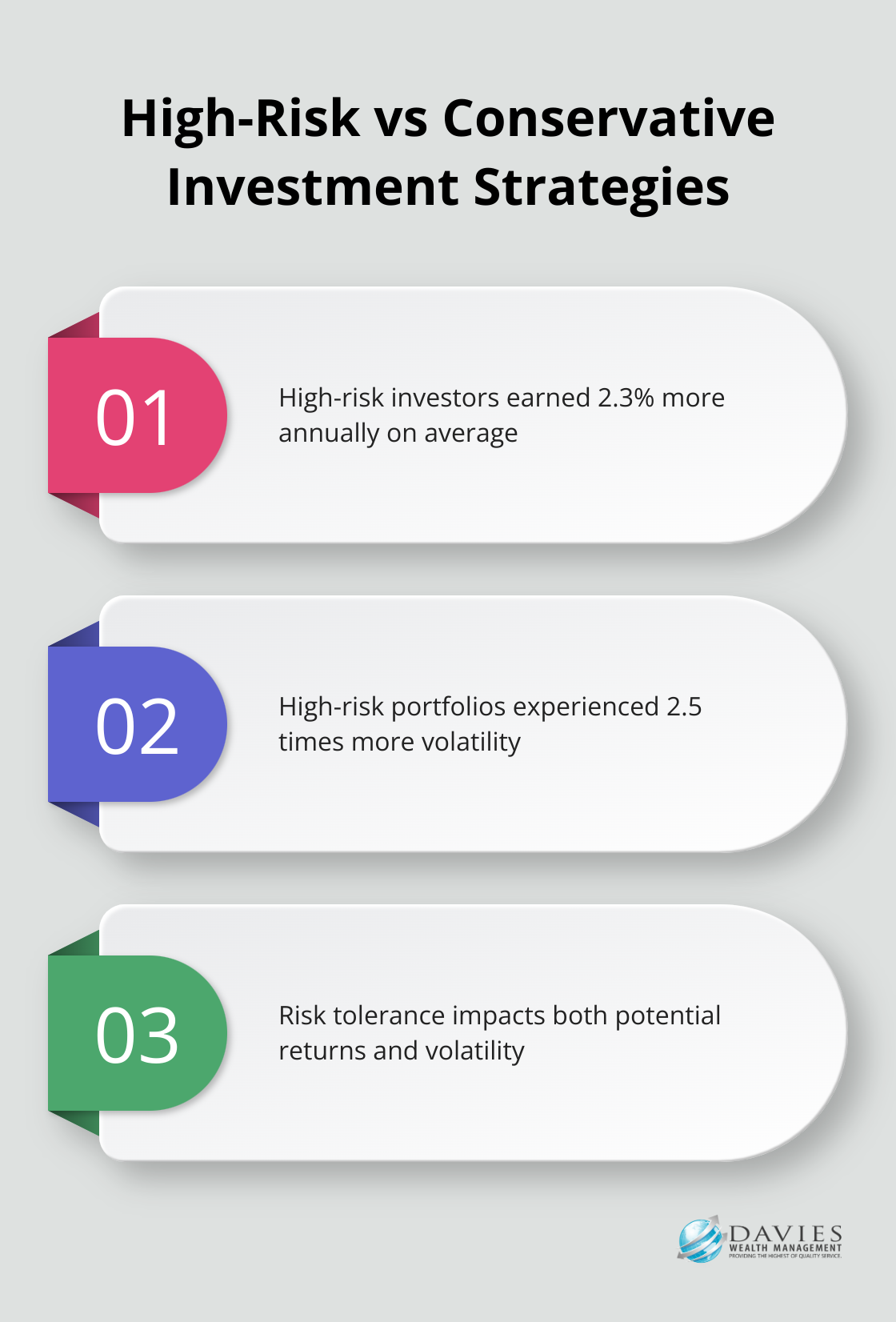At Davies Wealth Management, we understand that choosing the right long-term investment strategy is crucial for building wealth and achieving financial goals. Long-term investment advice often focuses on various approaches, each with its own merits and potential risks.
In this post, we’ll explore different investment strategies and provide guidance on how to select the one that best aligns with your personal circumstances and objectives.
Which Long-Term Investment Strategy Fits You?
At Davies Wealth Management, we believe that understanding different long-term investment strategies is essential for making informed decisions about your financial future. Let’s explore four popular approaches to help you determine which strategy aligns best with your goals and risk tolerance.
Value Investing: Seeking Hidden Gems
Value investing focuses on identifying undervalued stocks that have the potential for significant growth. This strategy involves thorough analysis of a company’s financials, market position, and future prospects. Value investors look for stocks trading below their intrinsic value, often due to temporary market inefficiencies or overlooked potential.
Warren Buffett, one of the most successful value investors, bought more than $1 billion in shares of the Coca-Cola Company (KO) in 1988, an amount that was then equivalent to 6.2% of the company.
Growth Investing: Riding the Wave of Innovation
Growth investing targets companies with strong potential for above-average growth in earnings and revenue. These companies often reinvest profits into expansion, research, and development rather than paying dividends. Tech giants like Amazon and Google are prime examples of successful growth stocks.
In 2020, large cap growth outperformed large cap value by more than 35%, which marked the largest margin of difference between the two in any calendar year.

Income Investing: Steady Cash Flow
Income investing prioritizes generating a consistent stream of income through dividends and interest payments. This strategy appeals particularly to retirees or those seeking regular cash flow. Real estate investment trusts (REITs), high-yield bonds, and dividend-paying stocks are common components of income-focused portfolios.
AT&T has been a favorite among income investors, with a dividend yield consistently above 5% in recent years. However, it’s important to assess the sustainability of dividend payments and not solely focus on high yields.
Index Investing: Embracing Market Performance
Index investing involves purchasing a broad market index (such as the S&P 500) to match overall market performance. This passive strategy offers diversification and typically lower fees compared to actively managed funds. Vanguard’s Total Stock Market Index Fund (VTSAX) is a popular choice for index investors, with over $1 trillion in assets under management.
A 2020 report by S&P Dow Jones Indices revealed that over a 15-year period, 88% of active fund managers failed to outperform their benchmark indices, highlighting the potential benefits of index investing.
Tailoring Strategies for Unique Needs
At Davies Wealth Management, we adapt these strategies to meet the unique needs of our clients, including professional athletes who require specialized financial planning. We consider factors such as career longevity, irregular income streams, and post-career financial security when crafting investment strategies for athletes.
The best long-term investment strategy for you depends on your individual circumstances, risk tolerance, and financial goals. In the next section, we’ll explore the key factors you should consider when choosing your investment approach.
What Shapes Your Investment Strategy?
Assessing Your Risk Appetite
Risk tolerance plays a key role in selecting an investment strategy. It encompasses both your emotional capacity to handle risk and the level of risk necessary to achieve your financial goals.
A Vanguard study revealed that high-risk tolerance investors who chose aggressive portfolios earned an average of 2.3% more annually over a 10-year period compared to conservative investors. However, they also experienced about 2.5 times more volatility.

For professional athletes, a more conservative approach during playing years often protects wealth, with a shift to a more aggressive strategy post-retirement when the investment horizon lengthens.
Defining Clear Investment Objectives
Your investment goals significantly influence your strategy. Whether you save for retirement, build wealth for a major purchase, or create a family legacy, each goal may require a different approach.
For retirement savings, a growth-oriented strategy in early career years, gradually shifting to income-focused investments near retirement, often works well.
Understanding Your Time Horizon
The duration you plan to hold your investments impacts your strategy choice. Longer time horizons typically allow for more aggressive strategies, as you have more time to weather market volatility.
Evaluating Your Current Financial Picture
Your current financial situation (including income, expenses, debts, and existing assets) should inform your investment strategy. Clients with stable, high incomes can often afford to take on more risk, while those with irregular income streams (like many professional athletes) may benefit from a more conservative approach.
A survey by the Financial Industry Regulatory Authority (FINRA) revealed that only 37% of Americans have three months of emergency savings. Ensuring a solid financial foundation before pursuing aggressive investment strategies proves crucial.

As we move forward, we’ll explore how to implement your chosen long-term investment strategy effectively, taking into account these key factors that shape your investment approach.
Implementing Your Long-Term Investment Strategy
Master Asset Allocation
Asset allocation forms the foundation of any successful investment strategy. It involves dividing investments among different asset categories, such as stocks, bonds, and cash. A well-balanced asset allocation can help you ensure your portfolio can weather market storms while still reaching your destination.
A young professional athlete might opt for a more aggressive allocation with 80% stocks and 20% bonds. In contrast, a retiree might prefer a conservative mix of 40% stocks and 60% bonds.
Embrace True Diversification
Diversification extends beyond owning different types of assets. It means spreading investments across various sectors, geographic regions, and company sizes. This approach helps manage risk and can potentially improve returns.
Instead of investing solely in U.S. large-cap stocks, consider adding small-cap stocks, international equities, and alternative investments like real estate investment trusts (REITs).
Harness the Power of Regular Rebalancing
Markets change constantly, and over time, your portfolio’s asset allocation can drift from your target. Regular rebalancing helps maintain your desired risk level and is good risk management, although it typically reduces long-term returns.
A common approach involves rebalancing annually or when your allocation drifts more than 5% from your target.
Adapt to Market Changes
Long-term investing requires patience, but it doesn’t mean you should ignore market trends. Stay informed about economic indicators and geopolitical events that could impact your investments.
The COVID-19 pandemic dramatically shifted market dynamics. Investors who recognized the potential of e-commerce and technology companies early on saw significant gains. Professional guidance can help you navigate these changes effectively.
Seek Professional Guidance
Implementing an investment strategy is an ongoing process that requires discipline and regular review. Professional advisors (like those at Davies Wealth Management) can provide valuable insights and help ensure your investment strategy remains aligned with your evolving goals.
Final Thoughts
Choosing the right long-term investment strategy is essential for achieving your financial goals. We have explored various approaches, each offering unique benefits and considerations. Your personal circumstances, including risk tolerance, investment objectives, time horizon, and current financial situation, will determine the most suitable strategy for you.
Successful implementation of your chosen strategy requires mastering asset allocation, embracing diversification, and committing to regular portfolio rebalancing. Staying informed about market changes and adapting your strategy when necessary are also key components of long-term investment success. At Davies Wealth Management, we understand that long-term investment advice is not one-size-fits-all.
We specialize in crafting personalized investment strategies that align with your unique goals and circumstances. Our expertise extends to serving professional athletes, addressing their specific financial challenges and helping them secure their financial future beyond their playing years. For expert long-term investment advice, contact Davies Wealth Management today.
✅ BOOK AN APPOINTMENT TODAY: https://davieswealth.tdwealth.net/appointment-page
===========================================================
SEE ALL OUR LATEST BLOG POSTS: https://tdwealth.net/articles
If you like the content, smash that like button! It tells YouTube you were here, and the Youtube algorithm will show the video to others who may be interested in content like this. So, please hit that LIKE button!
Don’t forget to SUBSCRIBE here: https://www.youtube.com/channel/UChmBYECKIzlEBFDDDBu-UIg
✅ Contact me: TDavies@TDWealth.Net
====== ===Get Our FREE GUIDES ==========
Retirement Income: The Transition into Retirement: https://davieswealth.tdwealth.net/retirement-income-transition-into-retirement
Beginner’s Guide to Investing Basics: https://davieswealth.tdwealth.net/investing-basics
✅ Want to learn more about Davies Wealth Management, follow us here!
Website:
Podcast:
Social Media:
https://www.facebook.com/DaviesWealthManagement
https://twitter.com/TDWealthNet
https://www.linkedin.com/in/daviesrthomas
https://www.youtube.com/c/TdwealthNetWealthManagement
Lat and Long
27.17404889406371, -80.24410438798957
Davies Wealth Management
684 SE Monterey Road
Stuart, FL 34994
772-210-4031
#Retirement #FinancialPlanning #wealthmanagement
DISCLAIMER
The content provided by Davies Wealth Management is intended solely for informational purposes and should not be considered as financial, tax, or legal advice. While we strive to offer accurate and timely information, we encourage you to consult with qualified retirement, tax, or legal professionals before making any financial decisions or taking action based on the information presented. Davies Wealth Management assumes no liability for actions taken without seeking individualized professional advice.



Leave a Reply